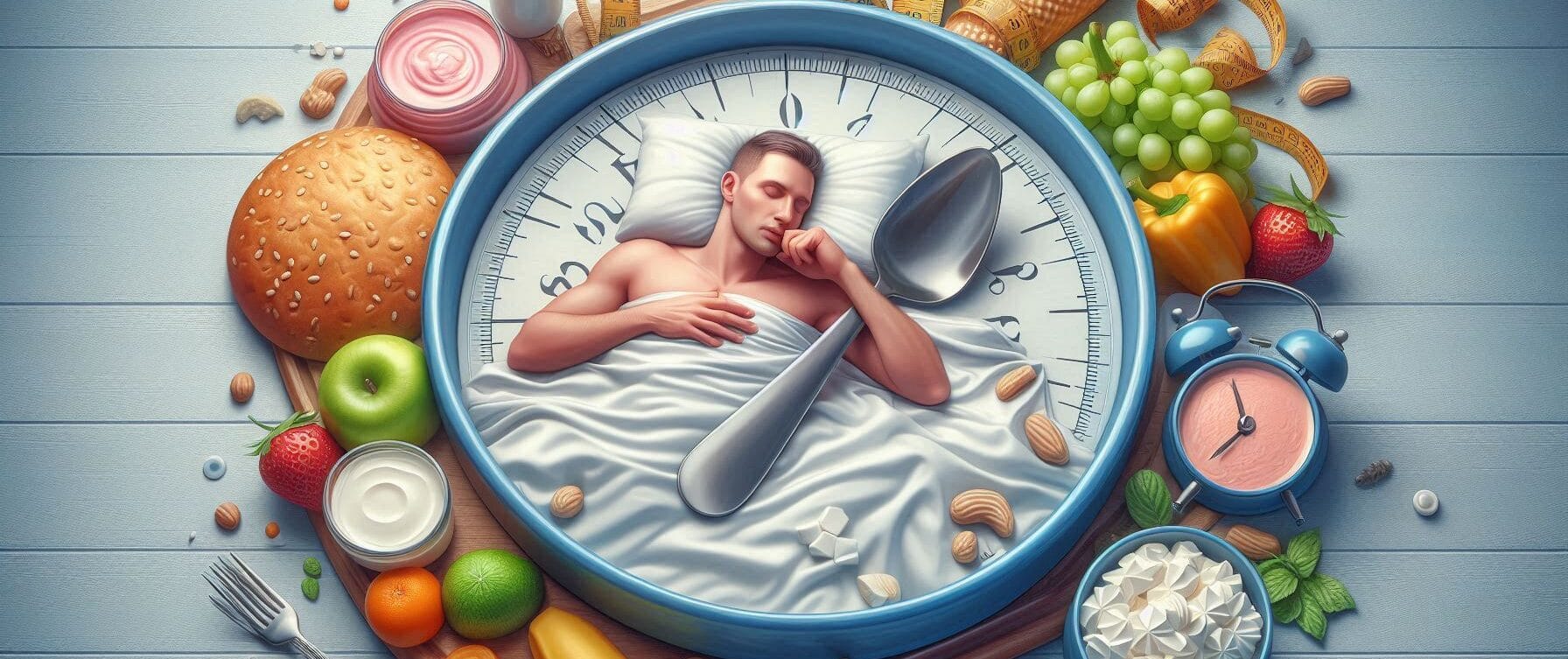Top Takeaways and Key Concepts
Prioritize 7–9 hours of sleep nightly to balance hunger hormones and prevent overeating.
Avoid late-night screen time to reduce ghrelin spikes and nighttime snacking urges.
Choose sleep over extra workouts when tired to prevent low energy and poor food choices.
Create a consistent bedtime routine by dimming lights and disconnecting from electronics.
Improve your sleep environment with blackout curtains, cool temperature, and fewer distractions.
Summary of This Article
This article explains how sleep plays a crucial role in weight loss by controlling hormones that regulate hunger and fullness. Lack of sleep raises ghrelin (hunger hormone) and lowers leptin (fullness hormone), which leads to cravings and overeating. Poor sleep also reduces energy, making healthy choices and exercise harder. The author suggests building healthy sleep habits like limiting screens before bed, creating a cozy sleep environment, and sticking to a routine. Even short power naps can help as long as they don’t interfere with nighttime sleep. The main message: sleep isn’t a luxury—it's a powerful weight loss tool that shouldn’t be ignored.

Let’s talk about something that often gets overlooked in the quest for weight loss: sleep. Yes, sleep! That glorious state where you can escape reality, dream of winning the lottery, and maybe even chase unicorns (or is that just me?). We often focus on diet and exercise like they’re the only keys to shedding those stubborn pounds.
But here’s a shocking revelation: if you’re not getting enough shut-eye, all your efforts could be going down the drain faster than a piece of pizza at a party.
The Science of Sleep and Weight Loss
First off, let’s dive into some science because nothing says “fun” quite like talking about hormones. When we sleep, our bodies regulate hormones like ghrelin and leptin. Ghrelin is what tells us we’re hungry—think of it as your inner gremlin urging you to devour an entire pizza at 2 AM.
On the other hand, leptin signals fullness. If you’re short on sleep, guess which hormone gets boosted? Yep, ghrelin! So now you’re wide awake at midnight with a craving for snacks that could rival a raccoon rummaging through trash cans.
I remember one particularly sleepless night when I decided to binge-watch an entire season of my favorite show instead of hitting the hay. By morning, I was convinced that I needed pancakes for breakfast—pancakes topped with whipped cream and chocolate syrup because why not? That day turned into an endless cycle of cravings fueled by lack of sleep.
Sleep Deprivation Equals Poor Choices
Now let’s see how this plays out in real life. When you're tired, your decision-making skills plummet faster than my willpower when someone offers me cookies. It’s true! Studies have shown that people who don’t get enough rest are more likely to choose high-calorie foods over healthier options. After all, who wants to whip up a salad when there are leftover donuts sitting in the kitchen?
I once tried meal prepping after a week of good sleep—I felt energized and ready to conquer healthy eating! But after one sleepless night filled with too much caffeine and questionable decisions involving late-night TV snacks…well, let’s just say my fridge was suddenly filled with takeout containers instead of kale.
The Energy Connection
Interestingly enough, lack of sleep doesn’t just mess with your hunger; it also zaps your energy levels. Ever notice how hitting snooze feels way better than working out? That’s because when we don’t get enough rest, our bodies crave quick sources of energy—and guess what those usually are? Sugary snacks or caffeine-laden drinks!
On days when I’ve had decent sleep, I feel motivated to hit the gym or go for a run (even if it means dodging squirrels). But after tossing and turning all night? Suddenly those jogging shoes look more like relics from another era—best left untouched in the closet!
Building Healthy Sleep Habits
So how do we fix this whole “not sleeping” situation? For starters, establishing good bedtime habits can make all the difference between waking up refreshed or feeling like you’ve been run over by a truck full of bricks.
I started dimming lights an hour before bed—no screens allowed! This simple change helped signal my body that it was time to wind down rather than scrolling endlessly through social media feeds filled with cat videos (which are hard to resist).
Creating a Cozy Sleep Environment
Speaking of cozy environments…let's chat about making your bedroom conducive to restful slumber! Think soft pillows, comfortable blankets—you know the drill! And interestingly enough, keeping electronics out helps minimize distractions.
When I finally invested in blackout curtains (goodbye pesky streetlights!), my quality of sleep improved dramatically. Now I wake up feeling rejuvenated rather than groggy from fighting off imaginary monsters lurking under my bed!
Napping Like a Pro
And hey—if you find yourself struggling due to lack-of-sleep during nighttime hours—a power nap might be just what you need! A quick snooze can recharge batteries without messing up nighttime routines too much.
But here’s where moderation comes into play: try keeping naps under thirty minutes so they don't interfere with falling asleep later on—it works wonders for clarity while preventing post-nap disorientation akin to waking up from hibernation!
Embracing Rest as Part of Your Routine
All things considered; incorporating adequate rest into your lifestyle isn’t merely beneficial but essential for sustainable weight loss success! As tempting as it may be sometimes—to sacrifice shut-eye for extra workouts or meal prep sessions—it ultimately backfires more often than not.
In conclusion—the next time someone asks why you're prioritizing sleep over late-night snacking marathons or treadmill sprints—you can confidently tell them it's part of building long-lasting healthy habits leading toward successful weight loss journeys!
Suggested Resources:
The Importance of Sleep in Weight Loss
https://www.healthline.com/nutrition/sleep-weight-loss
How Sleep Affects Your Weight
https://www.webmd.com/diet/features/how-sleep-affects-your-weight
Sleep Hygiene Tips
https://www.sleepfoundation.org/sleep-hygiene
Frequently Asked Questions
How does sleep affect weight loss?
Sleep regulates hormones that control hunger and fullness. Poor sleep increases ghrelin, which boosts appetite, and decreases leptin, making you feel less satisfied after eating.
How many hours of sleep should I get to support weight loss?
Aim for 7–9 hours of quality sleep each night to maintain hormonal balance, boost metabolism, and prevent overeating caused by fatigue.
Can lack of sleep cause weight gain?
Yes, sleep deprivation can increase cravings for high-calorie foods and reduce energy, leading to poor dietary choices and decreased physical activity.
What are some habits that improve sleep quality?
Stick to a consistent bedtime, limit screen time before bed, dim lights, and create a calm, cool, and dark sleep environment.
Is it better to exercise or sleep when I’m exhausted?
When you’re extremely tired, choosing rest is better. Sleep helps your body recover and prevents poor workout performance or overeating.
Do short naps help with energy and weight control?
Yes, power naps under 30 minutes can boost alertness and prevent fatigue-related cravings without interfering with nighttime sleep.
How can I make my bedroom more sleep-friendly?
Use blackout curtains, lower the room temperature, silence distractions, and remove electronic devices to promote deeper, more restful sleep.

Kevin Collier is a passionate health writer specializing in fat loss, weight loss strategies, and effective dieting techniques. With an emphasis on evidence-based approaches, he aims to provide readers with actionable insights that simplify the journey to achieving their weight loss goals. At TapFat.com, Kevin shares practical advice, tips, and motivational content to empower individuals to make informed choices about their diet and lifestyle. His mission is to support others in their pursuit of a healthier, fitter self, demystifying the weight loss process and celebrating each step toward success.




